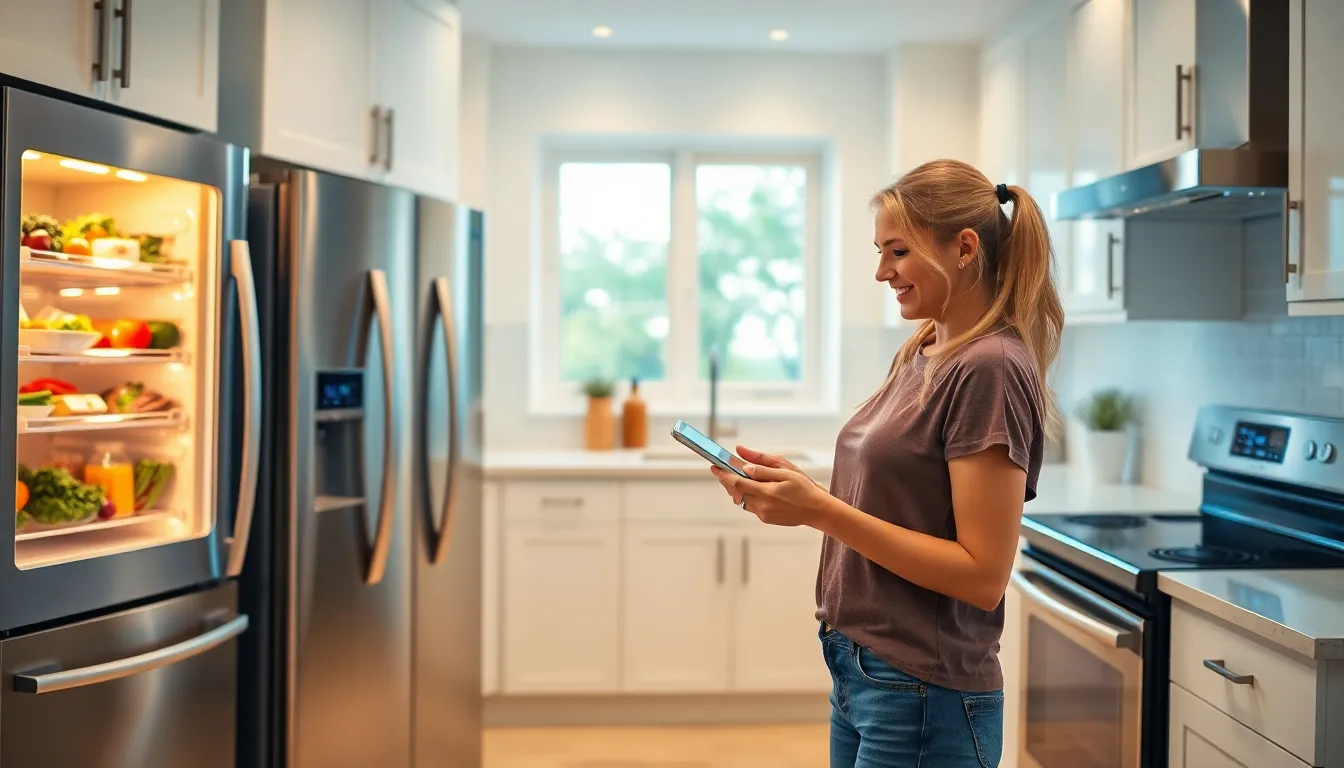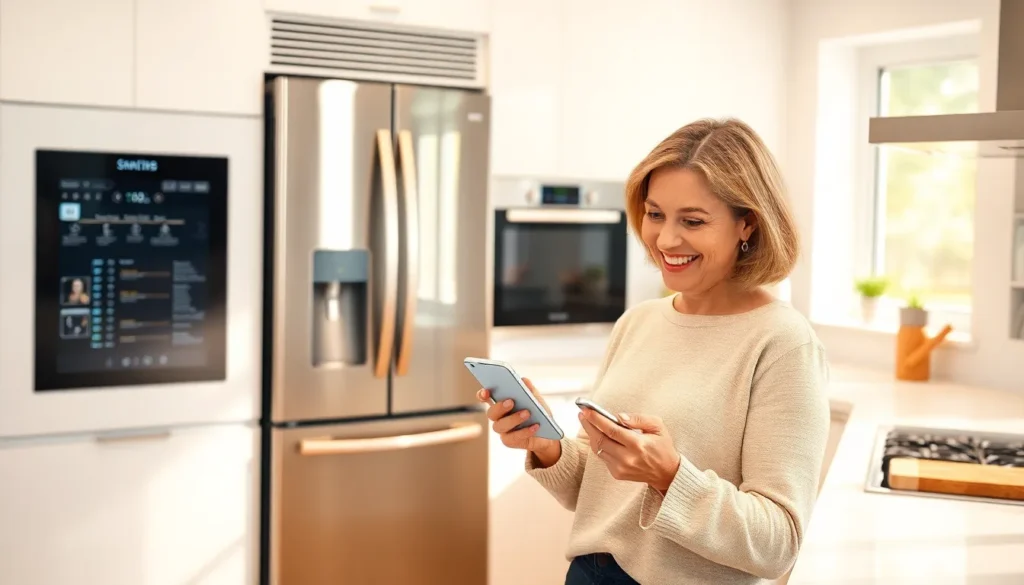Table of Contents
ToggleIn a world where your refrigerator can text you about its dwindling milk supply, connected appliances have become the new best friends in modern homes. These smart gadgets not only save time but also add a sprinkle of convenience to daily chores, turning mundane tasks into a tech-savvy adventure. Imagine your oven preheating while you’re still in your pajamas, or your washing machine sending you a gentle nudge when the laundry’s done.
Overview Of Connected Appliances
Connected appliances represent a significant advancement in household technology. These devices utilize the Internet of Things (IoT) to streamline everyday tasks. Users benefit from enhanced control, enabling actions like adjusting the thermostat or starting a washing machine remotely via smartphones.
Smart refrigerators, for instance, allow users to monitor contents, suggest recipes, and create shopping lists. Furthermore, connected ovens offer features like remote preheating and recipe-guided cooking. This interconnectivity provides convenience and time savings, transforming how individuals interact with their home environments.
Security also improves with connected appliances. Smart cameras and alarm systems allow monitoring home security from any location, providing peace of mind. Energy efficiency gains become apparent as smart thermostats and lighting systems adjust automatically based on user habits or time of day.
Data indicates that connected appliances can reduce energy consumption by up to 30%. This reduction results in cost savings for users while promoting sustainability. Additionally, manufacturers focus on continuous updates to enhance functionality and security, ensuring devices remain current with technological advancements.
Incorporating connected appliances into daily life leads to a more organized and efficient home experience. With the ongoing development of smart technology, these appliances are becoming increasingly prevalent in modern homes.
Benefits Of Connected Appliances

Connected appliances offer multiple advantages that enhance the modern home experience. These benefits range from convenience and energy efficiency to improved home security.
Enhanced Convenience
Convenience remains a standout feature of connected appliances. Smart devices allow users to control their household chores from anywhere, offering flexibility in busy lifestyles. For instance, a user can start their washing machine while at work, ensuring it’s ready upon arrival home. Notifications about completed laundry or preheated ovens decrease time spent on mundane tasks. Furthermore, smart refrigerators track food inventory and suggest meals, simplifying meal preparation and grocery shopping. Overall, connected appliances make managing daily routines easier.
Energy Efficiency
Connected appliances contribute significantly to energy efficiency. These devices can optimize power consumption, resulting in reduced energy bills by as much as 30%. Smart features adjust power settings based on actual usage, ensuring appliances run only when necessary. For example, a connected thermostat learns a user’s schedule, adjusting the temperature to minimize energy waste. Users can also monitor consumption in real-time through mobile applications, encouraging mindful energy use. This combination of smart technology and efficiency promotes sustainable living.
Improved Home Security
Home security sees notable improvements through connected appliances. Smart cameras enable real-time monitoring, alerting homeowners about unexpected activity. Users access live feeds from their smartphones, providing reassurance when away from home. Alarm systems can be integrated with motion sensors, which notify residents immediately of potential threats. Some connected appliances even allow remote control of locks, ensuring secure entry points. Enhanced security measures provide peace of mind while maintaining control over home safety.
Popular Types Of Connected Appliances
Connected appliances come in various forms, each enhancing convenience and efficiency in daily life. Users can enjoy significant benefits from these smart devices.
Smart Refrigerators
Smart refrigerators enable users to monitor inventory and manage groceries effortlessly. Features include internal cameras that provide visibility of contents, allowing users to avoid duplicates while shopping. They can suggest recipes based on available ingredients, streamlining meal preparation. Additionally, smart refrigerators create grocery lists that sync with mobile devices, ensuring users always know what to buy. Their ability to provide expiration alerts promotes food freshness and reduces waste.
Smart Thermostats
Smart thermostats optimize home heating and cooling by adjusting settings based on user habits. They learn preferences and create schedules that enhance comfort and energy efficiency. Users can control temperatures remotely through mobile apps, allowing adjustments while away from home. Data tracking features report energy consumption patterns, making it easier to identify savings opportunities. Integration with other smart devices also enables automated climate control, promoting optimal home environments.
Smart Washers And Dryers
Smart washers and dryers simplify laundry tasks by allowing remote operation and monitoring. Users can start or stop machines from their smartphones, fitting laundry into busy schedules with ease. Notifications about cycle completion alert users, preventing any potential laundry mishaps. Many models offer customizable wash cycles, optimizing cleaning based on fabric type. Energy-efficient settings minimize consumption, reducing both usage costs and environmental impact.
Challenges And Concerns
Connected appliances bring several challenges and concerns to consider. Addressing these issues is crucial for users to make informed decisions.
Privacy Issues
Privacy issues arise with connected appliances since they collect vast amounts of personal data. Many smart devices track user behavior, preferences, and usage patterns, leading to potential data breaches. Personal data stored on cloud servers can become vulnerable without proper security measures. Additionally, unauthorized access to data can occur if security protocols are insufficient. Users must understand that hacking incidents can compromise sensitive information, making privacy a critical concern. Selecting appliances from reputable manufacturers that prioritize data security mitigates some risks. Staying informed about privacy policies and understanding how personal data is used and shared also enhance user awareness.
Compatibility Problems
Compatibility problems hinder the seamless integration of various connected appliances. Not all devices work well together due to differing standards and protocols. Smart home ecosystems often face issues when trying to connect appliances from various brands. As a result, users may experience frustration and inefficiency when managing their devices. Proprietary technologies can limit interaction between brands, leading to additional complications. Regular updates may enhance compatibility on some devices, but not all appliances receive consistent support. Researching compatibility before purchasing new devices can help users ensure a cohesive smart home experience. Choosing devices that support common standards like Zigbee or Z-Wave simplifies the integration process.
Future Trends In Connected Appliances
Advancements in artificial intelligence (AI) will shape the future of connected appliances. Machine learning algorithms will enable devices to learn user habits, making them more intuitive and personalized. Voice-activated systems will become even more prevalent, allowing users to control appliances through natural language commands.
Integration with health monitoring will rise, as smart refrigerators may track dietary preferences and suggest healthier meal options. Energy management systems will optimize electricity usage, aligning consumption with lower utility rates. Predictive maintenance features will alert users to potential issues before they occur, reducing downtime and repair costs.
Sustainability initiatives will further influence appliance designs. Manufacturers will prioritize eco-friendly materials and energy-efficient technologies, aiming to minimize environmental impact. Additionally, increased interconnectivity will facilitate seamless integration within smart home ecosystems, allowing appliances to communicate and function cohesively.
Security advancements will focus on protecting sensitive user data. Biometric authentication methods, such as facial recognition and fingerprint scanning, will enhance access control. Regular software updates will ensure appliances maintain robust security protocols against evolving cyber threats.
User interfaces will evolve to be more visually appealing and user-friendly. Augmented reality (AR) features may allow users to visualize appliance functions in real time, enhancing the interaction experience. As connected appliances continue to advance, the overall convenience and efficiency in homes will significantly improve, driving further adoption.
The evolution of connected appliances marks a transformative shift in how households operate. These smart devices not only enhance convenience but also promote energy efficiency and security. By embracing the latest technology, homeowners can streamline daily tasks and enjoy a more organized living space.
As manufacturers continue to innovate, the integration of artificial intelligence and sustainability initiatives will further elevate the user experience. While challenges like privacy concerns and compatibility issues exist, the benefits of connected appliances far outweigh the drawbacks.
Ultimately, as they become more prevalent, connected appliances will redefine modern living, making homes smarter and more efficient.





